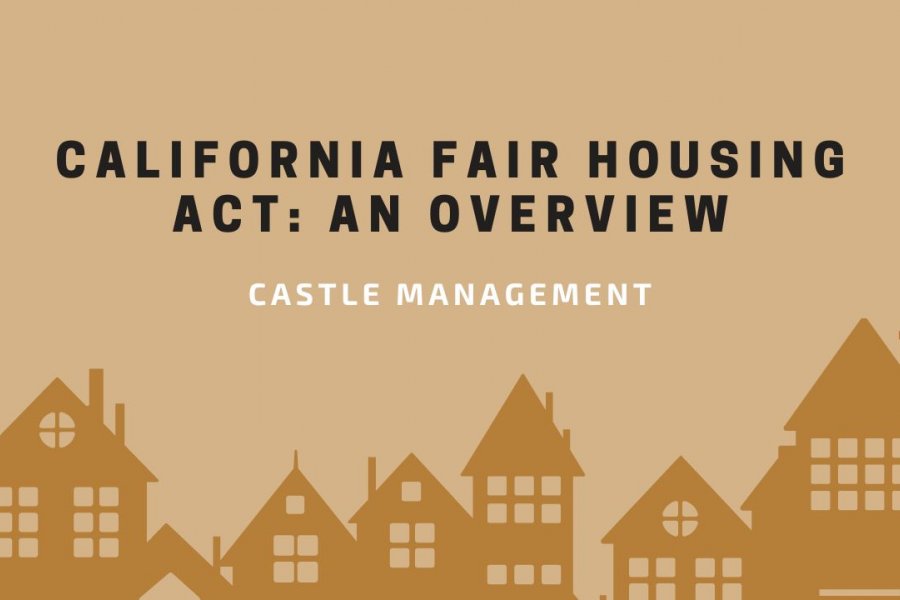
A housing provider has a variety of responsibilities when leasing out their property. While the rights and obligations of housing suppliers differ across states, all must adhere to fair housing laws.
These rules apply to all housing suppliers, whether they are renting out a single unit or a multi-family property. They are there to prevent tenants from facing discrimination based on their disability, sexual orientation, and more.
At Castle Management, we want to make renting your home a stress-free process with our services. That’s why this article will dive into everything you should know about California Fair Housing Act. We’ll explain this aspect of California landlord-tenant law, as well as give you tips to comply with them easily.
What Is the Fair Housing Act?
Enacted by Congress in 1968, the California Federal Fair Housing Act prohibits any housing provider from discriminating against tenants on the basis of certain protected characteristics, including disability, religion and national origin. The aim of California Fair Housing Act are to provide equal opportunities for people looking for a place to live.
The California Federal Fair Housing Act applies to renters, buyers, and even those looking to finance their housing, including those with a disability and families with children. It also helps individuals applying for housing assistance or community development funds, appraising their home, seeking mortgage lending, or entering their real estate with a listing service.
Who Oversees Fair Housing?
The U.S. Department of Housing and Urban Development (HUD) oversees the Fair Housing Act. It’s the duty of the department to handle complaints about discrimination related to housing, including cases involving housing discrimination against individuals with a disability or families with children.

They’re experts in the housing field, so they’re the best source to answer your housing questions about the Fair Housing Act and housing discrimination. Additionally, you can learn more about the act by checking out the HUD’s annual reports.
What Kind of Housing Discrimination Does the Fair Housing Act Prohibit?
California Federal law prohibit discrimination related to housing based on the six protected classes. These are race, national origin, religion, sex, disability, and familial status. Below we explain how each protected class is covered by fair housing laws.
Race
Rejecting interested renters due to their race in California is illegal discrimination related to housing. This forbids any housing provider from using terms or phrases that lead to racial discrimination in housing on any listing or marketing materials. An example would be to write “X need not apply” on a rental listing.
The act also forbids California housing suppliers from asking about race on applications, engaging in housing discrimination based on race, and discarding applications due to racial discrimination.
National Origin
When renting or selling real estate, you can’t reject a person based on their national origin. This includes housing discrimination against a person based on language or giving preferential treatment due to national origin or nationality housing discrimination.
Religion
It’s illegal to choose or reject a person based solely on their religion. The Federal Fair Housing Act also prohibits using phrases such as “great for Christians” or “[religious group] need not apply” to real estate listings. That’s why you shouldn’t ask a person about their religion and religious beliefs when marketing your property or performing screening checks.

Sex
It’s considered illegal housing discrimination to determine whom to lease to based on the sex of a person. This includes gender-based discrimination, such as suggesting that a specific unit is safer for women, for example. When trying to determine who’s the best person for your property, it’s best to take into consideration non-discriminatory criteria such as credit score, income, and rental history, not the sex of the individual.
Familial Status
California housing suppliers cannot choose to rent to a childless person over a family with small children or a pregnant woman, as this would be illegal discrimination based on familial status. The housing suppliers also can’t ask questions regarding a person’s familial status during the screening process, as it’s considered discriminatory and an act of discrimination to do so.
Disability
It is illegal for California housing suppliers to discriminate against persons because of a disability. Additionally, it’s their responsibility to provide a person with a disability reasonable accommodation or make reasonable modification to accommodate disabilities in the rental property.
A disability can include physical, mental, or emotional disabilities that limit one or more major life activities. Landlords must treat all persons equally, regardless of a visible or invisible disability, and ensure their practices comply with fair housing rules.
Refusing to rent, failing to respond to a request, or charging extra fees because of a disability can all be considered discriminatory behavior.
Additional Protected Classes
In addition to the classes protected by federal fair housing laws, you must also abide by state and local fair housing laws. In California, it's considered illegal housing discrimination to deny persons based on their:
- Source of income
- Sexual orientation
- Marital status
- Age
- Arbitrary physical characteristics such as having tattoos, piercings, or an uncommon hairstyle
- Gender identity and gender expression
- Immigration status
Are There Any Exemptions to the Fair Housing Act?
Yes, there are exemptions to Fair Housing Act. However, these generally don't apply to private landlords.

Possible Fair Housing Act exemptions include the following:
- Religious organizations. Religious organizations can choose to provide housing only to members of their community.
- Private clubs. Clubs can deny housing to individuals who are not club members.
- Local law occupancy standards. You can limit the number of occupants per unit if your local laws state a maximum occupancy number.
- Owner-occupied housing. This only applies when a landlord lives in a rental with less than four total units.
- Senior Housing. This allows communities and buildings meant for occupants 55 and older to operate. However, this is not usually relevant to rental property owners who own a few single-family homes. To qualify for this exemption, the property must meet the qualifications listed here.
How to Provide Fair Housing
Complying with the California fair housing laws and rules can seem challenging, but it doesn’t have to be that way. Here are some simple things you can do to provide fair housing in California:
- Create non-discriminatory advertising. Avoid using discriminatory language in your listing. Instead of focusing on the type of tenant you’re looking for, use the space to highlight the amenities and unique characteristics of your property.
- Be honest. Take the time to answer any questions applicants have about the house. Refrain from lying about housing availability and refrain from using discrimation.
- Set a fair rent price. Do some market research to ensure you set a fair rate for your rental. If you own a multi-family property, avoid charging higher rent only to certain tenants.
- Screen your tenants. As per the state fair housing laws, you’re required to accept all applications from interested renters, but this doesn’t mean you don’t get to choose whom you rent to. To choose applicants, it’s best to rank them based on non-discriminatory criteria, such as rental history and their ability to pay rent.
- Treat tenants fairly. State fair housing laws also apply to existing tenants. When dealing with tenant conflicts or disputes, make sure to treat your renters fairly. To stay safe from liabilities, always refer to your lease agreement when enforcing rules and document all requests and complaints.
Bottom Line
California fair housing laws provides renters equal chances of finding appropriate housing. It’s your responsibility as a landlord to abide by local and federal law at all points during a tenancy. This includes not discriminating against protected classes such as familial status, disabilities, race, sex, and more, during the application process and treating all tenants fairly once they’re renting from you.
In addition to California fair housing law, you should be aware of local landlord-tenant laws, security deposit policies, and the legal eviction process. This will keep you and your investment safe from legal liabilities.
If you’re looking for someone to handle all the legal responsibilities of being a landlord for you, Castle Management can help you with our services! As we have an in-depth understanding of the obligations of landlords in California, our services can ensure your property abides by the law.
We understand the importance of effective property management services in maintaining the value and appeal of your rental properties.
Our comprehensive California property management services include regular maintenance, thorough tenant screening, and prompt handling of repair requests, all while adhering to industry rules and regulations to ensure a seamless rental experience for both landlords and tenants. Contact us to learn more!
Disclaimer: This blog should not be used as a substitute for legal advice from a licensed attorney in your state. Laws change, and this post might not be updated at the time of your reading. Please contact us for any questions you have in regard to this content, or any other aspect of your property management needs.
